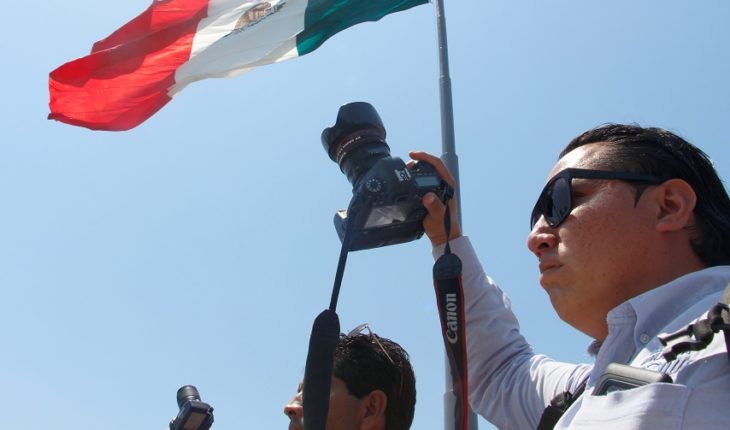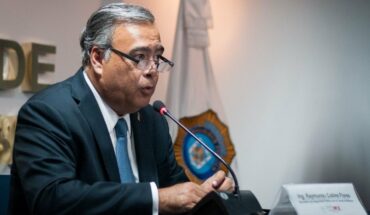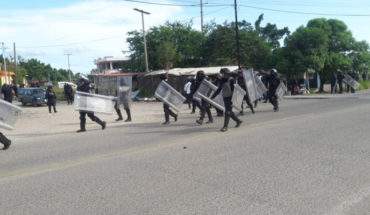-Yes, ma’am, I’m still alive.
Journalist Andrés Palafox answers the phone call with a smile while ordering tea at any other restaurant.
“I’m still the same old, veneer as usual,” he jokes.
Andrés then confirms that he is still in the same location half an hour ago, and pronounces a keyword with which the operator of the Journalist Protection Mechanism ensures that the one on the other side of the device is really him, and cuts the call thus starting an n See the countdown that will end within another 30 minutes, when you will receive the same routine call.
“It’s too heavy that you’re being marked all the time to ask you if you haven’t been killed yet,” Says Andrew resignedly but without losing the black sense of humor, one of the traits that most define it.
“That’s why I try to waver the operators of the Mechanism and joke with them, to make this situation lighter.”
After the sentence, the reporter leaves on the table the panic button, a kind of cell phone with colored buttons that must be pressed according to the degree of emergency.
He explains that when he says “this situation” he refers to a myriad of threats that began in 2016, when he began posting in the Weekly Playa News notes and videos criticizing local and state authorities of Quintana Roo, which increased in intensity to suffer four assassination attempts.
For these attacks, the young reporter explains, has been part of the Protection Mechanism of the Ministry of the Interior since last March, together with 330 other journalists who are also beneficiaries of protection measures today, in a particularly lethal country for the press.
There are 131 murders between 2000 and 2019, of which 11 were committed in the only 10 months that the government of López Obrador has carried. This year has been one of the most violent against the press. As documented by the civil organization Article 19, 249 assaults were recorded from January to July, one every 17.4 hours.
But, although the panic button has become an extension of his hand, Andrew shrugs his shoulders and says he doesn’t feel more protected than before he had to move from his state.
“This button is a good thing, because you’re being monitored 24 hours a day,” he admits. “But it alone doesn’t prevent attacks.”
In fact, in the last four years the Mechanism has not prevented 7 journalists threatened and part of it from being killed by their aggressors, such as the case of journalist Rubén Pat, colleague of Andrés Palafox in the Weekly Playa News, who was shot dead in July last year for his journalistic activity.
“What is that about the Mechanism?”
For this reason, the Quintanarroense points out that there are still many outstanding lists to achieve true comprehensive, medium and long-term care.
Earrings that, being fair, Andrés points out, are not only the responsibility of the Mechanism, but also of other government institutions that should protect journalists, such as state prosecutors and public security secretariats.
“There are many things that do not depend on the Mechanism. They can give the alert for a unit to go and help you. But if unity does not go, it is not the fault of the Mechanism,” says the journalist, who says that he himself has suffered from this situation.
In one of the four attacks, Andrés narrates that several armed subjects tried to break into his home. The reporter activated the panic button and the Mechanism reacted quickly by asking local police to send a patrol to the home. But the aid did not arrive until two hours later, time in which the assailants, frustrated at not being able to access the house, left bored not without first firing five bullets at the property to try to reach the journalist.
“The operators of the Mechanism also despair. On that occasion, I heard the guy answering my distress call walking away from the phone and screaming that how fucked up it was possible to not send me the unit,” recalls Andrés Palafox.
Another problem is that, despite the mechanism being created seven years ago, in 2012, there is still a deep ignorance of who it is and who it protects, and why.
“On many occasions, when I have called 911 they have no idea what the Mechanism is. And many state prosecutors don’t know what it is either,” says Palafox, who after suffering another of the attacks against him wanted to report the assault to a state prosecutor’s office and the state prosecutor’s office denied him that right, arguing that he “had no journalist’s credential” and that ” he did not work for a recognized national media.”
“I tried to explain to them that I am under the protection of the Mechanism, and that if I were not a journalist, I would not be in that Mechanism,” the reporter says in a weary voice. But the Prosecution’s response to all this was: What is that about the Mechanism?”
“The bad guys won: they silenced us”
The Guerreense journalist Omar Bello has been in the Protection Mechanism for two years, at which time he had to exile himself from his state to continue his life. Although that thing about continuing with life is a saying, it’s quick nuance. Because this one hasn’t been the same since she had to run.
“The Mechanism, as a governmental entity, saves your life, it is true. But it saves your physical life, because you don’t care about working life.”
“And at the end of the day,” adds the reporter, “the goal of the one day who intended to silence you and annul you, because you no longer write out of fear.”
“This is extremely worrying because the victims are accomplishing their task, which is to get rid of critical voices with power,” warns Leopoldo Maldonado, deputy regional director of the Article 19 journalists’ organization.
“This is the most brutal form of censorship, after the murder and enforced disappearance. And so far, there has been no efficient response from the Mexican state to guarantee journalists a safe return to their states and jobs.”
In a gold cage
Omar Bello says he now lives “locked like a little bird in a gold cage.” With housing, food and basic attentions covered by the Mechanism, but without work or money to support or help his family, and without the possibility of returning to journalism.
“If you work, you’re out of the Mechanism,” he says. “Because if you do, the Mechanism deduces that you are already remaking your life and that you are no longer a displaced person, and that protection measures are therefore no longer necessary.”
Omar and other journalists such as Gildo Garza, president of the Association of Displaced and Assaulted Journalists, raised these criticisms during the presentation on 26 August of the UN office’s mexico office’s diagnosis of the Mechanism of Protection, where they demanded comprehensive care that goes beyond providing them with a shelter for a few months or escorts.
On this point, Leopoldo Maldonado also stresses the need for the burden of the policy of protection of journalists not only to fall on the Protection Mechanism.
Find out: Protection mechanism does not have sufficient resources; applications increased 172% in 7 years, UN alert
“The Mechanism, by itself and functioning in isolation, is going to collapse and is unworkable,” stresses the activist, who points out that protection needs to be involved much more actively in the legislature of prosecutors and state governments, while in subsequent attention other secretariats of state, such as Labour, Economics, and Health, should participate to help reporters find work alternatives and psychological care where required.
The Mechanism will be redesigned
Faced with these questions, Animal Político sought out Aaron Mastache, head of the Human Rights Defense Unit of the Ministry of the Interior (Segob) to learn his position, but there was no answer.
Who has spoken publicly on multiple occasions is Alejandro Encinas, undersecretary of human rights, who has said that there will be a redesign of the Mechanism to avoid failures in the care of journalists and human rights defenders.
On 25 March, for example, Encinas admitted that the mechanism’s actions are reaction and not prevention. For this reason, the government of López Obrador will implement instruments to identify risk situations, minimize bureaucratic measures, and expedite urgent protection measures, other large requests from journalists and article 19.
Encinas said that the beneficiaries’ private escorts will also be replaced by escorts trained by the Federal Preventive Police, and that the government of López Obrador will audit the trust that manages its resources to monitor its proper application.
What we do in Animal Político requires professional journalists, teamwork, dialogue with readers and something very important: independence. You can help us keep going. Be part of the team.
Subscribe to Animal Politician, receive benefits and support free journalism.#YoSoyAnimal
translated from Spanish: Journalists under the Protection Mechanism, out of work and displaced
September 17, 2019 |





